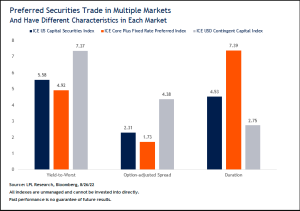Like most financial markets, preferred securities have generated negative returns so far this year, however the value proposition remains. Preferreds offer genero us yields, both absolute and after-tax, with their high income stream serving as a total return buffer against future spread volatility. “Preferred securities can be higher yielding alternatives to traditional core fixed income options. They are concentrated in the financial sector but since the global financial crisis, many financial institutions have emerged with stronger balance sheets, which should limit downgrades and defaults,” noted LPL Financial Fixed Income Strategist Lawrence Gillum.
us yields, both absolute and after-tax, with their high income stream serving as a total return buffer against future spread volatility. “Preferred securities can be higher yielding alternatives to traditional core fixed income options. They are concentrated in the financial sector but since the global financial crisis, many financial institutions have emerged with stronger balance sheets, which should limit downgrades and defaults,” noted LPL Financial Fixed Income Strategist Lawrence Gillum.
Following are five things investors should know before allocating to preferred securities.
- Hybrid securities. Preferred securities are “hybrid” securities that can be classified as either equity or debt within a company’s capital structure. They are senior to common equity but junior to traditional debt. As such, they don’t have the same capital appreciation potential of common equity nor do they possess the same capital preservation benefits of traditional debt. Preferred securities, then, tend to offer higher coupon payments to attract investors.
- Financial focus. The majority of issuance comes from financial institutions. Preferred securities are highly correlated with the health of the financial system and a shock to the financial system would adversely impact these securities.
- Credit risk. The securities tend to be BBB- or BB-rated, which means they carry higher levels of credit and default risks than the senior debt issued by the same issuer. However, since the issuers of preferred securities tend to be higher quality companies, default rates have been lower than similarly rated non-financial corporate bonds.
- Multiple markets. As seen in the LPL Chart of the Day, preferred securities trade in different markets and while the issuer could be the same, the individual security characteristics can be different. The $25 retail market (ICE Core Plus Fixed Rate index) is an exchange-traded market where the securities generally have longer durations and lower yields, whereas the $1000 institutional market (ICE US Capital Securities index) is an over-the-counter traded market where the securities pay dividends semi-annually. Finally, non-US issuers trade primarily in yet a different market (ICE USD Contingent Capital index) with different characteristics and different risk premium.
 5. Diversification benefits. Given the hybrid nature of preferred securities, there are diversification benefits to adding preferreds to a portfolio. While these securities tend to “act” like equity and high-yield fixed income securities across a full market cycle, since the financial crisis in 2009, these securities have generally held up better than both during equity market sell-offs (as measured by the S&P 500 Index).
5. Diversification benefits. Given the hybrid nature of preferred securities, there are diversification benefits to adding preferreds to a portfolio. While these securities tend to “act” like equity and high-yield fixed income securities across a full market cycle, since the financial crisis in 2009, these securities have generally held up better than both during equity market sell-offs (as measured by the S&P 500 Index).Despite the lower earnings environment for financials this year (75% are issued by banks and insurance companies), the fundamental health of the financial system remains intact. In fact, with June’s release of the Fed’s 2022 “stress test” results, banks proved able to absorb more than $600 billion in losses while maintaining minimum common equity capital requirements. Bottom line, these financial institutions can likely weather any potential recessionary storm while continuing to pay dividends on their preferred securities. So, for those income-oriented investors willing to take on some additional credit risk, preferred securities might be an attractive investment to consider.
Tracking # 1-05320046
Many people spend 10, 20, and 30 years working and end up with very little savings. Don't be one of them! Avoid these 12 financial mistakes so you can build wealth over your lifetime. Share them with friends, share them with family.
By submitting this form, you are consenting to receive marketing emails from: . You can revoke your consent to receive emails at any time by using the SafeUnsubscribe® link, found at the bottom of every email. Emails are serviced by Constant Contact
MRR approval: 05320046
This material is for general information only and is not intended to provide specific advice or recommendations for any individual. There is no assurance that the views or strategies discussed are suitable for all investors or will yield positive outcomes. Investing involves risks including possible loss of principal.
This material was prepared by LPL Financial, LLC.


